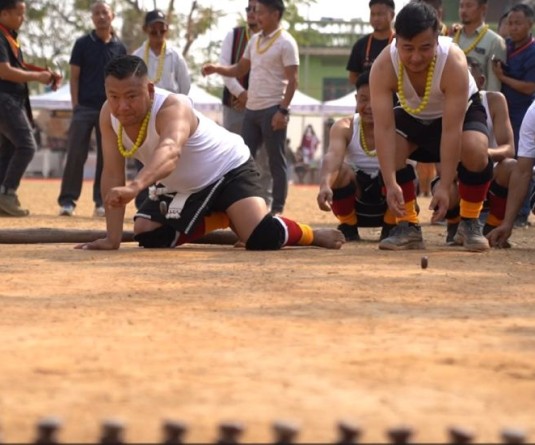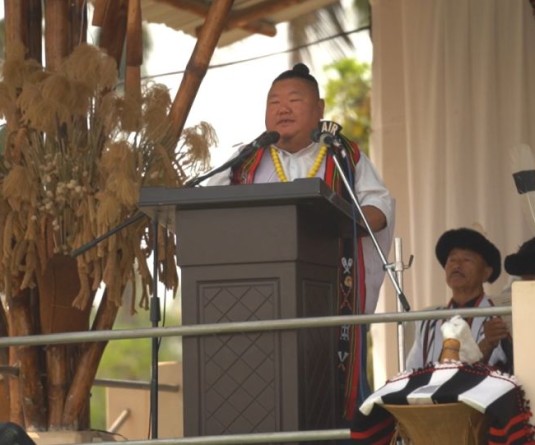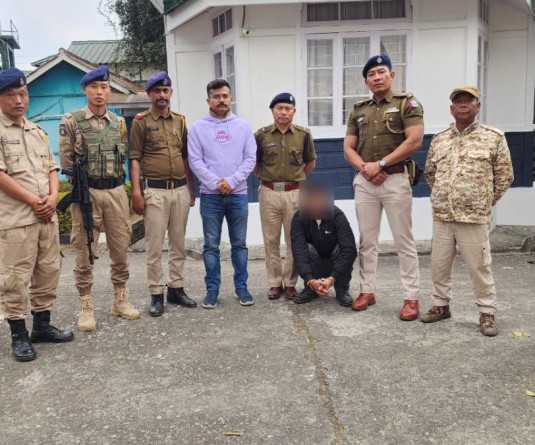
Participants along with organizers and facilitator of the recently organized workshop in Delhi by the Naga Peoples’ Movement for Human Rights (NPMHR) (Delhi).
Dimapur, August 7 (MExN): The definition and state of Indigenous Peoples, challenges from the militarization of their lands and the role of these peoples in the modern economic setup were the focus of a workshop in Delhi recently organized by the Naga Peoples’ Movement for Human Rights (NPMHR) (Delhi).
The workshop focused on globalization and how it affects the indigenous peoples with special reference to the Nagas and their struggle for right to self-determination, the NPMHR informed today. The Delhi unit of the NPMHR had organized a two-day training workshop on the topic “Naga people in the era of globalization: issues and challenges” during August 4 to 5 in the Indian Social Institute, Delhi.
The workshop, designed for 20 people, was attended by 26 participants. It was facilitated by Ramesh Moon from Henry Martyn Institute, an ecumenical Christian organization that researches and works on inter-faith relations and reconciliation.
The first day introduced the participants to Indigenous Peoples, their international definition and how India does not recognize the existence of Indigenous Peoples but rather asserts that its entire people are ‘indigenous’. With this understanding and the conceptual clarity, the group further discussed the way to take forward the obligations to the community in the rapidly changing world.
The second day examined various issues of globalization especially developmental issues. It delved at the impact of militarization, conflict and human right violation by revisiting the Naga history and citing specific cases such as “the Oinam incident” (1987) and the “Mokokchung incident” (1994). It further looked at how in recent times nature of violations and abuses come in subtle and sophisticated forms; very often in the name of developmental projects and also ‘military civic action’ and in the garb of peace.
The group studied the United Nations Declaration on the Rights of Indigenous Peoples (UNDRIP) and other conventions (ILO 169) and how these instruments can be used by the Nagas. The group also discussed Naga women, their organizations and their role in the society vis-à-vis challenges of patriarchy.
According to a note from the NPMHR ‘participants affirmed how the workshop has given them exposure to other tribes, and helped them to identify themselves as Nagas.’
The workshop focused on globalization and how it affects the indigenous peoples with special reference to the Nagas and their struggle for right to self-determination, the NPMHR informed today. The Delhi unit of the NPMHR had organized a two-day training workshop on the topic “Naga people in the era of globalization: issues and challenges” during August 4 to 5 in the Indian Social Institute, Delhi.
The workshop, designed for 20 people, was attended by 26 participants. It was facilitated by Ramesh Moon from Henry Martyn Institute, an ecumenical Christian organization that researches and works on inter-faith relations and reconciliation.
The first day introduced the participants to Indigenous Peoples, their international definition and how India does not recognize the existence of Indigenous Peoples but rather asserts that its entire people are ‘indigenous’. With this understanding and the conceptual clarity, the group further discussed the way to take forward the obligations to the community in the rapidly changing world.
The second day examined various issues of globalization especially developmental issues. It delved at the impact of militarization, conflict and human right violation by revisiting the Naga history and citing specific cases such as “the Oinam incident” (1987) and the “Mokokchung incident” (1994). It further looked at how in recent times nature of violations and abuses come in subtle and sophisticated forms; very often in the name of developmental projects and also ‘military civic action’ and in the garb of peace.
The group studied the United Nations Declaration on the Rights of Indigenous Peoples (UNDRIP) and other conventions (ILO 169) and how these instruments can be used by the Nagas. The group also discussed Naga women, their organizations and their role in the society vis-à-vis challenges of patriarchy.
According to a note from the NPMHR ‘participants affirmed how the workshop has given them exposure to other tribes, and helped them to identify themselves as Nagas.’






